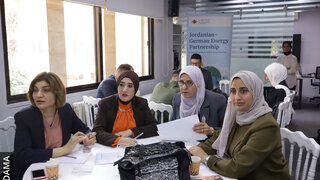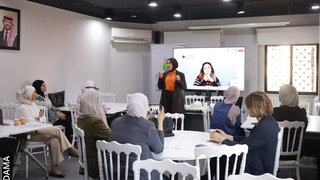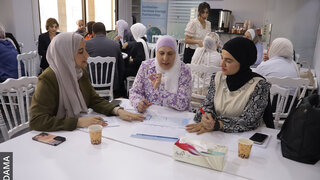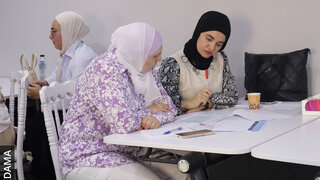SHE LEADS Workshop II: From Stories to Solutions – Validating Challenges Facing Women in the Energy Sector
Amman, Jordan

As part of the Jordanian-German Energy Partnership, the second "She Leads" workshop took place on the 28th July 2025 under the patronage of the German Federal Ministry for Economic Affairs and Energy (BMWE) and the Jordanian Ministry of Energy and Mineral Resources (MEMR). Organized by EDAMA on behalf of the German Energy Agency (dena), the session brought together 25 professionals from across the energy sector to validate and prioritize key challenges faced by women in the field.
Building directly on the first workshop’s theme “Unseen Risks and Unheard Stories,” this second session focused on reviewing and organizing the challenges faced by women in the energy sector. These included gender-based discrimination, exclusion from leadership roles, limited access to professional opportunities, and structural or policy-related barriers.
After welcoming remarks from Eng. Rasha Abu Marrar (MEMR) and Berdice Boudiaf (dena), participants worked in small groups to cluster, prioritize, and expand upon the challenges identified earlier in the series. This group work helped to narrow down a wide range of individual experiences into a focused set of systemic barriers.
Through this collaborative process, participants developed a structured framework of eight key challenge areas and ranked them by urgency and impact, setting the stage for solution-oriented work in future sessions.
- Workplace Discrimination and Gender Biased Exclusion: Persistent gender bias, lack of trust in female leadership, and professional isolation remain significant barriers.
- Unfair HR Practices and Career Advancement: Structural bias in hiring, promotions, and layoffs disproportionately affects women.
- Work-Life Balance Constraints: Working mothers face systemic penalization due to rigid workplace expectations and lack of flexibility.
- Lack of Enforcement of Labor Laws: Existing labor protections are often ignored, with women reporting exploitation and unethical employment practices.
- Unsafe and Hostile Work Environments: Harassment and retaliation against women who report abuse highlight the need for safe reporting mechanisms and cultural change.
- Lack of Recognition and Motivation: Many women feel undervalued and disconnected from workplace leadership, impacting morale and retention.
- Barriers in Technical Education and Career Paths: Isolation in academic and professional technical fields, combined with skepticism of women’s qualifications, limits advancement.
- Limited Regional Access and Structural Barriers: Women outside Amman or urban centers face compounded challenges due to centralized opportunities and lack of safe transport.
The workshop closed with a strong sense of momentum, as participants committed to co-developing actionable solutions in the upcoming sessions on the 20th of August. This process marks a vital step toward a more inclusive, equitable energy transition in Jordan.


